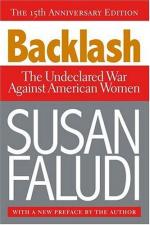
|
| Name: _________________________ | Period: ___________________ |
This quiz consists of 5 multiple choice and 5 short answer questions through Epilogue.
Multiple Choice Questions
1. Faludi claims that the requirement of parental consent results in which of the following statistics?
(a) A reversal in the eighteen-year trend of a downward teenage birthrate.
(b) A two percent rise in second trimester abortions.
(c) A forty percent climb in the birth rate among fifteen to seventeen-year-olds.
(d) All answers are correct.
2. The "Big Lie" joins ____________ to the "dime-store moralism of yesteryear."
(a) Legal maneuvering.
(b) Religious dogmatism.
(c) Scientific research.
(d) Undercover journalism.
3. ________ issues more miniskirts and says older women want to feel sexy on the job and ________ agrees: "gals" like to show their legs.
(a) Bill Blass, Calvin Klein.
(b) Calvin Klein, Christian Lacroix.
(c) John Weitz, Christian Dior.
(d) No answers are correct.
4. Faludi identified which of the following books as the most widely quoted and influential feminist work in the 1980s?
(a) Sex and Destiny.
(b) In a Different Voice.
(c) Ms. Still.
(d) Sexual Personae.
5. Faludi states that in 1986, NBC and Cosmopolitan warn women of three side effects of divorce including:
(a) Loneliness, depression, and childlessness.
(b) Childlessness, bitterness, and financial ruin.
(c) An empty bank account, bitterness, and loneliness.
(d) Depression, loneliness, and an empty bank account.
Short Answer Questions
1. Which 1980s movie is credited for fueling a "monogamy trend" and "reinvigorating marriage"?
2. What is the message of chapter 11, "The Backlash Brain Trust: From Neocons to Neofems"?
3. All of the following are researchers on the Harvard-Yale marriage study EXCEPT:
4. According to Faludi, men's opposition to women's rights and the feminist movement is a source of:
5. Which of the following occur following Reagan's second term in office?
|
This section contains 359 words (approx. 2 pages at 300 words per page) |

|




